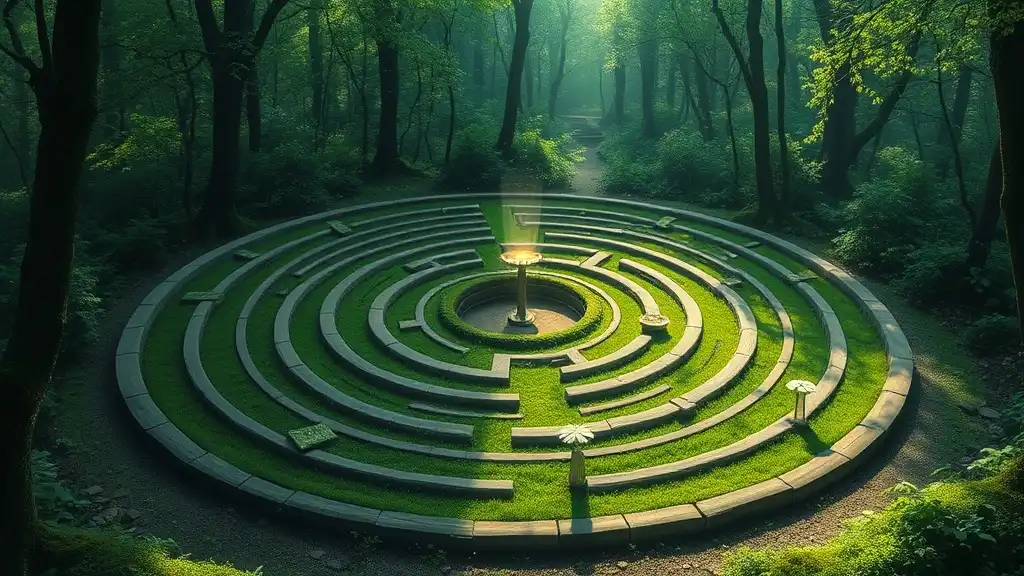The labyrinth is not just an intricate design or decorative feature; it is a profound spiritual symbol that has captivated souls for centuries. Often seen as a tool for reflection, meditation, and personal transformation, the labyrinth serves as a metaphor for the journey of life itself—a winding path that leads us through complexities, challenges, and ultimately, into deeper self-understanding.
The Labyrinth: A Brief History
Origins of Labyrinths
Labyrinths have ancient origins, dating back thousands of years. Early examples have been discovered across various civilizations, from the Minoans in Crete to Native American cultures and beyond. These structures were often associated with rituals and spiritual significance, representing the journey toward enlightenment or inner peace. In ancient Greece, the story of the Minotaur, a creature trapped in the labyrinth, symbolizes the duality of darkness and light, with the labyrinth acting as a sacred space for transformation and self-discovery.
Labyrinths in Modern Spirituality
In contemporary spirituality, fascination with labyrinths has surged. They are now often found in gardens, spiritual retreats, and places of worship, where people can engage in the practice of walking them. This revival reflects a collective yearning for introspection and connection in a fast-paced, chaotic world. Modern labyrinth programs often incorporate themes of mindfulness, healing, and community, making the labyrinth accessible to various spiritual seekers.

The Spiritual Significance of Labyrinths
Symbolism of the Labyrinth
The labyrinth symbolizes the journey inward—a path that represents our life experiences. As one navigates the winding turns, it serves as a physical metaphor for the decisions and complexities we face daily. Reaching the center signifies a moment of clarity, connection, or enlightenment, while the return path symbolizes the integration of those insights into our lives. The spiral design encourages individuals to embrace the cyclical nature of life, illustrating that the journey itself holds as much value as the destination.
Labyrinth as a Tool for Meditation
Walking a labyrinth is a powerful meditative practice. It offers an opportunity to disconnect from the noise of daily life, allowing participants to tune into their inner thoughts and emotions. The act of walking, combined with mindful breathing, creates a space for peace and reflection. Studies suggest that this practice can lower stress levels, enhance creativity, and promote emotional healing. The labyrinth, therefore, acts not only as a pathway but as a sacred container for transformation, fostering deep connection with oneself and the universe.

Walking the Labyrinth: A Spiritual Practice
Preparing for Your Journey
Before entering a labyrinth, preparation is key. Setting intentions enhances the experience, allowing you to focus on what you hope to achieve during your journey. Consider reflecting on questions that may be weighing on your mind or areas in your life where you seek clarity. Grounding techniques, such as deep breathing or visualization, can help center your energy and open your heart to the experience ahead.
Walking the Labyrinth
As you begin your walk, let go of expectations and trust the journey. Allow your feet to guide you, embracing each turn and curve as it comes. Being mindful and present during the walk can unveil insights that may not surface in everyday life. With each step, you may feel yourself connecting more deeply to the earth, finding a rhythm that resonates with your spirit. This act isn’t just about reaching the center; it's about allowing yourself to experience every moment along the way.
Reflection After the Walk
Once you complete your walk, take time to reflect. Journaling your experience can help solidify insights and feelings that arose during your journey. Consider what you discovered—any shifts in perspective or emotions that emerged. Integrating these insights into your daily life can lead to profound personal growth, encouraging you to act with intention and awareness.

Different Types of Labyrinths
Chartres Labyrinth
Arguably the most famous labyrinth is located in Chartres Cathedral in France. This medieval marvel is renowned for its intricate design and spiritual significance. Many view the Chartres Labyrinth as a pilgrimage destination, where walkers engage in sacred rituals. The labyrinth's design, with its 11 circuits, encourages reflection and meditation, drawing individuals into a sacred space where they can connect with the divine.
Outdoor vs. Indoor Labyrinths
Both outdoor and indoor labyrinths offer unique benefits. Outdoor labyrinths immerse participants in nature, enhancing feelings of connection to the earth. Many find that these settings amplify their experience, surrounded by the elements. Indoor labyrinths, on the other hand, often provide a controlled environment that fosters tranquility and focus. Regardless of the setting, the act of walking a labyrinth remains a profound spiritual practice.

Creating Your Own Labyrinth
Designing a Personal Labyrinth
For those inspired to create their own sanctuary, designing a personal labyrinth can be a deeply fulfilling project. Start with a simple outline in your yard or home, using materials like stone, wood, or even paint to map out the path. Emphasize the intention behind its creation—this space will be a refuge for contemplation, connection, and peace.
Using Technology to Create Virtual Labyrinths
In our tech-driven world, virtual labyrinths have become popular. Apps and online resources allow individuals to walk guided virtual labyrinths, accessing the spiritual benefits from the comfort of their homes. These digital experiences often come with audio guidance for mindfulness practices, making it easier than ever to embed labyrinth walking into your spiritual routine.

Conclusion
The labyrinth is a timeless symbol of the human quest for understanding, peace, and connection. By walking its path, we embark on a journey not only through the physical space but also within our own spirits. It invites us to embrace the complexities of life, find clarity amidst the chaos, and return to our lives transformed. For those seeking a deeper connection to oneself or the universe, the labyrinth provides a sacred pathway to introspection and growth.

FAQs About Labyrinths and Spirituality
What are some common questions about labyrinths? Here’s a quick overview to clarify any lingering doubts:
-
How do I find a labyrinth near me? Many local parks, temples, and spiritual retreats have labyrinths open to the public. Online directories can help locate one nearby.
-
Can anyone walk a labyrinth? Absolutely! Labyrinths are for everyone, regardless of spiritual background. They serve as a universal tool for reflection and meditation.
-
What if I can't find a physical labyrinth? You can create your own labyrinth with simple materials at home or explore virtual labyrinths online.
Remember, the knowledge and experience gained through walking a labyrinth extend far beyond the physical act. It’s a journey of the spirit that invites you to explore, reflect, and grow.



















